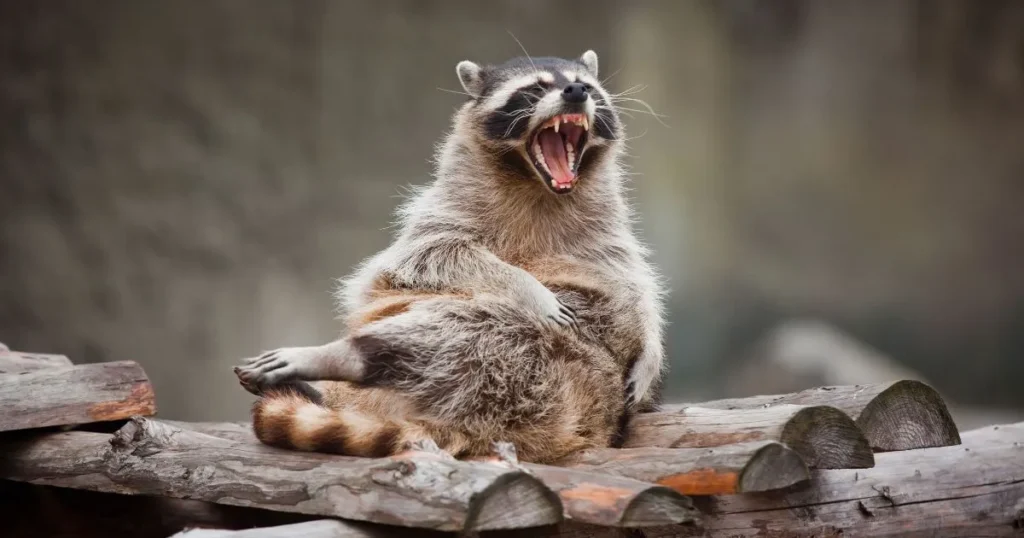Raccoons are fascinating creatures known for their adaptability, intelligence, and resourcefulness. However, one of their behaviors that often alarms homeowners is their tendency to scream, especially at night. This unsettling vocalization raises questions about what drives raccoons to make such eerie sounds. Understanding the reasons behind these screams can help homeowners address the root causes and proactively mitigate the disturbances.
This comprehensive article will explore why raccoons scream, the factors contributing to this behavior, and how to prevent it. We will also discuss the importance of professional wildlife removal services to ensure a humane and effective solution to raccoon-related problems.
Understanding Raccoon Vocalizations
Raccoons are highly vocal animals, capable of producing a wide range of sounds that serve different communication purposes. Among these sounds, the scream is among the most intense and alarming. To understand why raccoons scream, it’s essential first to recognize the various contexts in which these vocalizations occur.
Mating Calls and Territorial Disputes
One of the primary reasons raccoons scream is related to mating and territorial behavior. During the breeding season, typically from January to March, male raccoons become highly competitive as they seek to attract females. These mating calls are often loud and aggressive and can be easily mistaken for signs of distress. The scream serves as a call to potential mates and a warning to rival males to stay away.
Female raccoons may also scream in response to aggressive advances from males or when protecting their young. This behavior is widespread in urban areas, where raccoons are forced into closer proximity, leading to more frequent encounters and vocal disputes.
Mother Raccoons and Kit Communication
Mother raccoons are highly protective of their kits (young raccoons), and their vocalizations play a crucial role in maintaining this bond. When a mother raccoon is trying to locate her wandering kits or when the kits are in distress, they emit high-pitched screams. This form of communication is essential for ensuring the family stays together and avoids potential dangers.
Kits may also scream when hungry, cold, or threatened. This vocalization signals to the mother that they need attention, prompting her to respond quickly.
Defensive and Alarm Screams
Raccoons face threats from predators, including coyotes, owls, and domestic dogs. When a raccoon feels threatened or cornered, it may emit a scream as a defensive mechanism. This scream serves two purposes: it can startle the predator, give the raccoon a chance to escape, and alert other raccoons in the area to danger.
Raccoon social groups also use alarm screams to warn each other of impending threats. This vocalization is particularly important in areas where multiple raccoons share a territory, as it helps to ensure the group’s safety.
Stress and Anxiety Triggers
Like many other animals, raccoons can experience stress and anxiety, especially in environments exposed to human activity. Urban raccoons, in particular, may scream when they feel trapped, cornered, or encounter something unfamiliar. This could include being caught in a trap, chased by a dog, or even encountering a loud noise.
In such situations, the scream expresses the raccoon’s fear and stress. Understanding this behavior can help humans take appropriate measures to reduce unnecessary stress on raccoons, such as using humane traps and avoiding confrontations.
Nighttime Activity and Scream Frequency
Raccoons are nocturnal creatures, meaning they are most active during the night. This nocturnal lifestyle contributes to the frequency of raccoon screams heard at night. The darkness covers their activities, making it the prime time for foraging, mating, and defending their territory.
The increased activity at night also means that interactions with other raccoons, potential threats, and human disturbances are more likely to occur during these hours, leading to more frequent vocalizations. Homeowners who hear raccoons screaming at night may be witnessing territorial disputes, mating calls, or a mother raccoon calling to her kits.
Preventing Raccoon Screams: Practical Steps for Homeowners
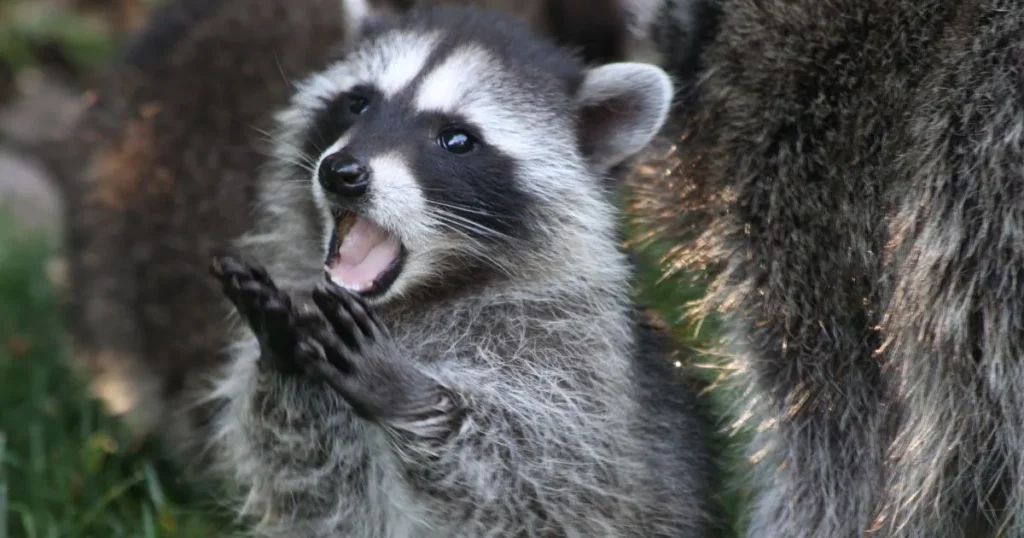
Living near raccoons can lead to frequent nighttime disturbances, particularly during the breeding season. However, homeowners can take several proactive steps to prevent raccoons from frequenting their property and reduce the likelihood of hearing these unsettling screams.
Secure Food Sources
Food availability is one of the main reasons raccoons are drawn to residential areas. Raccoons are opportunistic feeders, often scavenging through trash cans, pet food left outdoors, and even gardens. Securing all potential food sources is essential to discourage raccoons from visiting your property.
- Use Raccoon-Proof Trash Cans: Invest in sturdy trash cans with tight-fitting lids that raccoons cannot easily open. Consider using bungee cords or other locking mechanisms to secure the lids.
- Remove Pet Food: Avoid leaving pet food outside overnight, attracting raccoons and other wildlife. Feed your pets indoors or remove any uneaten food promptly.
- Protect Gardens and Compost Bins: If you have a garden, use fencing or netting to keep raccoons out. Ensure that compost bins are sealed tightly to prevent raccoons from accessing food scraps.
By eliminating easy access to food, you can reduce the likelihood of raccoons frequenting your property and engaging in territorial or mating disputes that lead to screams.
Eliminate Shelter Opportunities
Raccoons are also attracted to properties that offer shelter, such as attics, chimneys, and crawl spaces. These areas provide a safe and warm environment for raccoons to nest, especially during the breeding season. To prevent raccoons from taking up residence on your property, it is crucial to eliminate these shelter opportunities.
- Seal Entry Points: Inspect your home for gaps or openings allowing raccoons to enter. This includes checking around chimneys, vents, and rooflines. Seal any potential entry points with durable materials such as metal mesh or hardware cloth.
- Install Chimney Caps: Chimneys are a common entry point for raccoons. Installing a chimney cap can prevent them from accessing your home while allowing smoke to escape safely.
- Trim Overhanging Branches: Raccoons are excellent climbers who can use overhanging branches to access your roof. Regularly trim trees and shrubs near your home to reduce the risk of raccoons climbing onto your roof.
Taking these precautions can help prevent raccoons from nesting on your property, reducing the likelihood of hearing screams associated with their territorial and mating behaviors.
Use Humane Deterrents
If raccoons already frequent your property, humane deterrents can encourage them to move on without causing harm. These deterrents are designed to make your property less appealing to raccoons without injuring them.
- Motion-Activated Sprinklers: These devices are triggered by movement and spray water when a raccoon approaches. The sudden burst of water startles the raccoon, encouraging it to leave the area.
- Ultrasonic Repellents: Ultrasonic devices emit high-frequency sounds that are unpleasant to raccoons but inaudible to humans. These sounds can deter raccoons from approaching your property.
- Light and Sound Devices: Raccoons are nocturnal and prefer dark, quiet environments. Motion-activated lights or sound devices can disrupt their comfort and encourage them to seek shelter elsewhere.
Using these humane deterrents, you can reduce raccoon activity on your property and decrease the chances of hearing their screams at night.
Impact of Human Activity on Raccoon Behavior
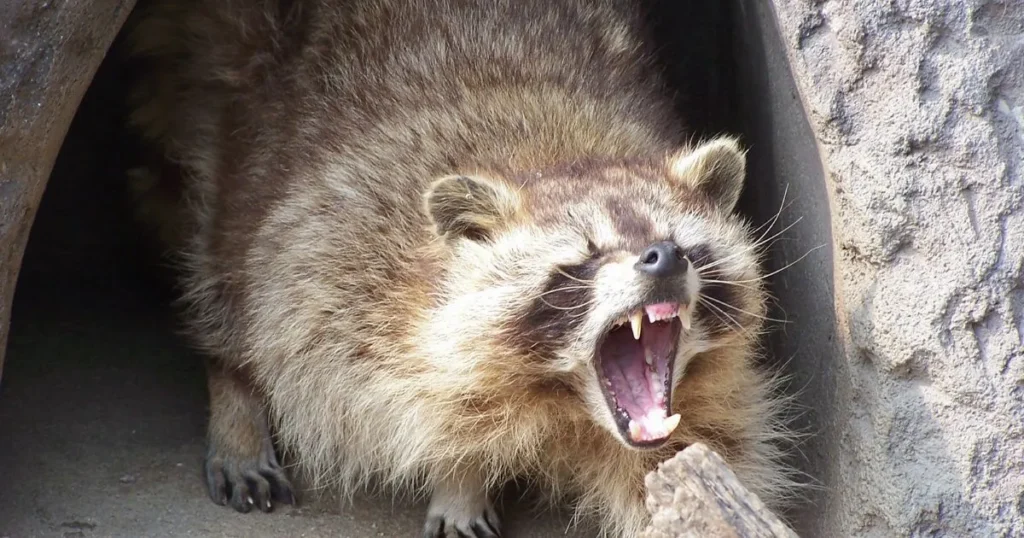
Human encroachment into natural habitats has significantly impacted raccoon behavior, including their vocalizations. As urban areas expand, raccoons are forced to adapt to new environments, often bringing them closer to humans and domestic animals. This proximity can increase the likelihood of stress-induced screams as raccoons navigate unfamiliar and usually dangerous urban landscapes.
Urban Environments and Increased Vocalization
Raccoons face unique challenges in urban areas, from finding food in trash cans to avoiding cars and other human-related dangers. These challenges can lead to increased stress and anxiety, resulting in more frequent vocalizations, including screams. Additionally, the close quarters of urban living mean that raccoons are more likely to encounter each other, leading to more territorial disputes and mating competition.
Moreover, urban noise pollution can mask the sounds that raccoons use to communicate, forcing them to be louder and more persistent in their vocalizations. This can increase the overall noise level, making raccoon screams more noticeable to human residents.
Human Interaction and Wildlife Control
As raccoons adapt to urban environments, they often conflict with humans. This can lead to raccoons screaming in response to being trapped, chased, or threatened by human activity. Wildlife control efforts that involve trapping or relocating raccoons can also provoke screams as the animals react to the stress of being captured.
Humane methods of wildlife control are essential to minimize the impact on raccoons. This includes using non-lethal traps, providing escape routes, and avoiding unnecessary confrontations. By understanding the reasons behind raccoon screams, we can take steps to coexist with these animals in a way that reduces stress and promotes a peaceful living environment.
When to Seek Professional Help
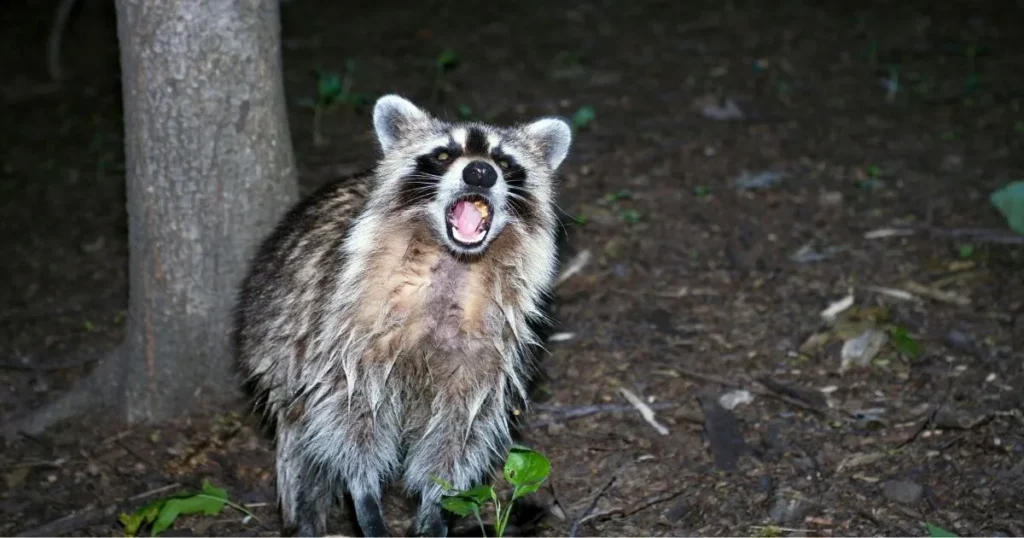
While there are many steps homeowners can take to prevent raccoon screams, there are situations where professional assistance may be necessary. If you have a persistent raccoon problem, or if a raccoon has already taken up residence in your home, it is advisable to contact a wildlife control professional.
Signs You Need a Professional
- Raccoons Inside Your Home: If you hear scratching, thumping, or vocalizations from your attic or walls, a raccoon has likely entered your home. Professional wildlife control experts can safely and humanely remove the animal and help you seal entry points to prevent future invasions.
- Frequent Raccoon Sightings: If you frequently see raccoons on your property, especially during the day, it may indicate that they have established a den nearby. A wildlife control professional can assess the situation and provide recommendations for removal and prevention.
- Damage to Property: Raccoons can cause significant damage to roofs, insulation, and other structures in their search for shelter. If you notice signs of damage, it is important to address the issue promptly to prevent further destruction.
Working with Critter Stop: Your Trusted Wildlife Control Partner
When dealing with a raccoon problem, choosing a wildlife control service that uses humane and ethical methods is essential. Critter Stop is a professional wildlife removal company specializing in humane raccoon removal and exclusion services. With a fantastic reputation and outstanding customer reviews, Critter Stop is known for its high-quality work and exceptional customer service.
Critter Stop’s team of experts begins by thoroughly inspecting your property to identify entry points, food sources, and potential nesting sites. Based on this assessment, they developed a customized plan that may include trapping, exclusion, and habitat modification. All trapping is done humanely to relocate the raccoons to a suitable habitat away from human populations.
After removing the raccoons, Critter Stop will help you seal entry points and recommend additional deterrents to prevent the problem from recurring. Their comprehensive approach ensures that your home is protected and that raccoons are treated with care and respect.
For those facing a raccoon problem, Critter Stop offers a free inspection to assess the situation and provide tailored solutions. Don’t wait until the problem escalates—call Critter Stop at (214) 234-2616 to schedule your inspection and take the first step towards a raccoon-free home.
Conclusion
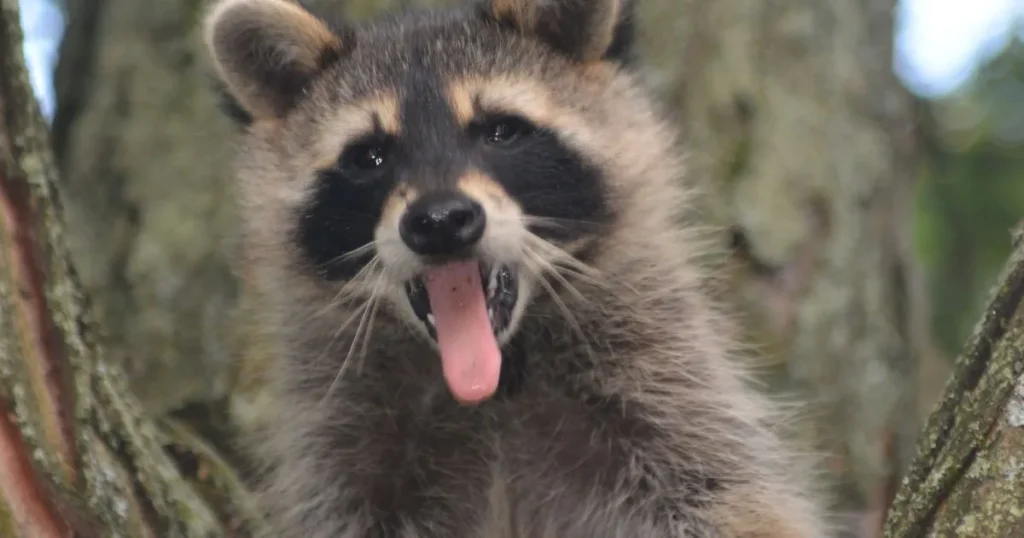
Raccoon screams can be unsettling, but understanding the reasons behind this behavior can help homeowners take proactive steps to prevent it. By securing food sources, eliminating shelter opportunities, and using humane deterrents, you can create a less attractive environment for raccoons. Do not hesitate to seek professional help to address more severe raccoon problems when necessary.
By taking these measures, you can reduce the likelihood of raccoon encounters on your property and enjoy a quieter, more peaceful living environment.
Frequently Asked Questions About Raccoon Screaming Behavior
Raccoons are nocturnal creatures that often surprise homeowners with their unsettling vocalizations, especially at night. These screams can be alarming and raise concerns about what might be causing this behavior. In this FAQ section, we explore some of the most common questions related to raccoon screams, helping you understand why they occur and what you can do to address the issue.
Why do raccoons scream at night, and what causes this unsettling behavior in urban areas?
Raccoons scream at night primarily because they are nocturnal and most active during these hours. The screams can be linked to territorial disputes, mating calls, or even stress caused by urban environments. In urban areas, raccoons are often forced into closer contact with each other and with humans, which can increase the frequency of these vocalizations. The presence of predators or the need to establish dominance over territory are common triggers for this nighttime screaming.
Are there specific reasons why do raccoons scream when they encounter other animals?
Yes, raccoons may scream when encountering other animals, particularly if they feel threatened or compete for resources. These screams can serve as a warning to other raccoons or animals to stay away. During confrontations with other wildlife, raccoons may also use these vocalizations to assert dominance or to protect their young. The intensity of these encounters often leads to more vocal expressions, making the screams more frequent and noticeable.
What are the most common situations where we hear raccoons screaming during the breeding season?
During the breeding season, which typically occurs from January to March, raccoon screams are most commonly heard when males compete for access to females. These screams can be part of aggressive encounters between males or mating calls intended to attract females. Females may also scream to ward off unwanted advances or communicate with potential mates during this time. The breeding season’s heightened aggression and competition make these vocalizations particularly common.
Raccoons screaming in the attic – what does it mean and how can you address it?
If you hear raccoons screaming in your attic, it often means that a raccoon has taken up residence in your home, possibly to raise its young. The screams could be due to territorial disputes, stress from being confined, or communication between a mother raccoon and her kits. Contacting a professional wildlife removal service like Critter Stop is essential to address this issue. Our experts can safely and humanely remove the raccoons, seal entry points, and ensure they don’t return, protecting your home from further damage.
In what circumstances do raccoons scream, and what are they trying to communicate?
Raccoons scream in various circumstances, such as during fights, feeling threatened, or seeking mates. These vocalizations are a form of communication, conveying messages like warnings to rivals, distress signals, or calls for mates. Understanding the context of these screams can provide insight into the behavior and needs of the raccoons, whether they are seeking territory, food, or safety.
When do raccoons scream the most, and how can homeowners reduce this noise?
Raccoons tend to scream the most during the breeding season and at night when they are most active. To reduce this noise, homeowners can take preventive measures such as securing trash cans, removing food sources, and sealing potential entry points to attics and basements. Using humane deterrents like motion-activated lights or sprinklers can also help keep raccoons away from your property. If the problem persists, contacting a professional service like Critter Stop for a free inspection and humane removal is the best course of action to restore peace to your home.

